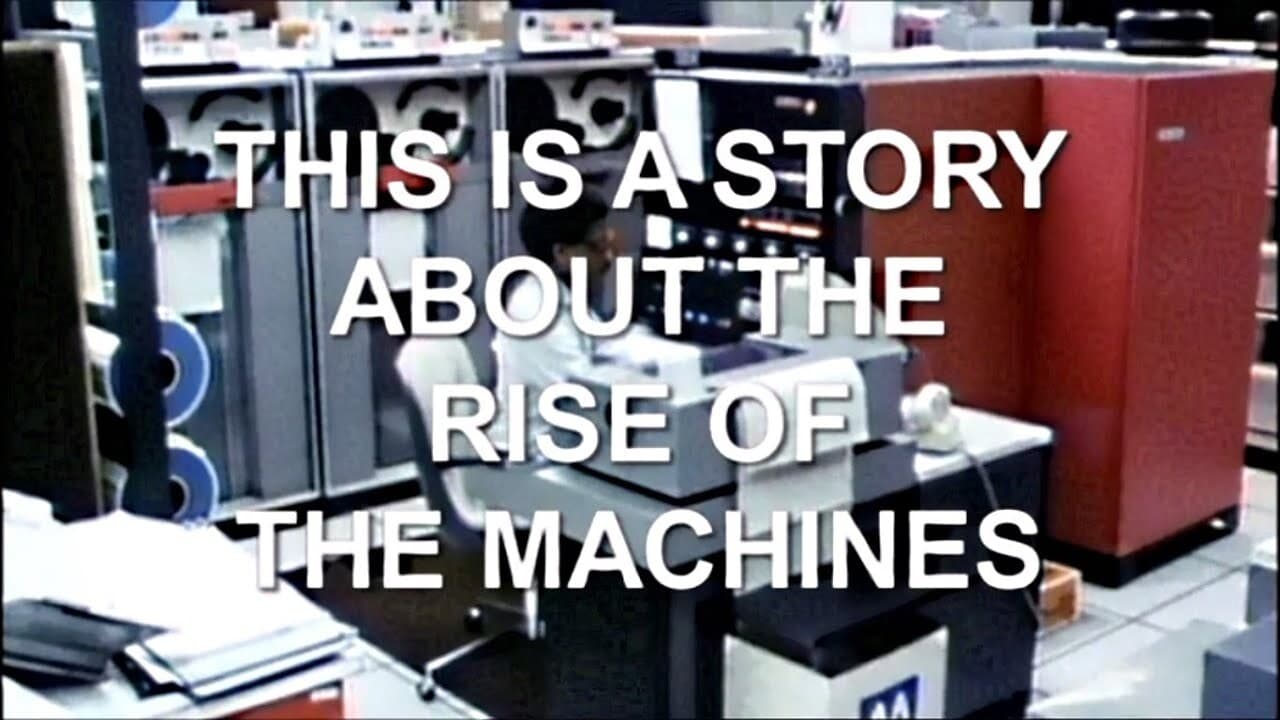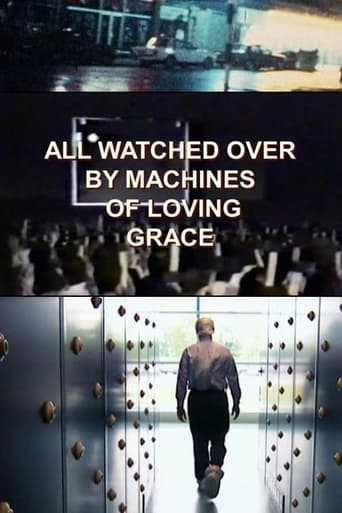

big ideas. At some point though, I began to feel that the narrator is manipulating information to conform to his conclusions. For instance, he attacks the global financial system and its architects, and portrays them as causing only suffering. But he leaves out the huge increase in global prosperity that has occurred over the last decades. He says that China kept its exchange rate artificially low, and used the trade surplus to lend back to the US instead of helping its own citizens. He leaves out that average Chinese citizen's income is maybe 7 to 10 times what it was 25 years ago. There's a story here and it's not all good or bad. The characters highlighted in the film are interesting and important - but the film misses an opportunity to reveal something more profound about the mysteries of our times - instead I think it leads viewers to simplistic conclusions that can perhaps be as damaging or more than Ayn Rand's philosophies.
... View MoreBombarded with images, sounds, and ideas that at times overgeneralizes and in other instances create bizarre connections, Curtis's documentary is deceptive, its true purpose buried in impressive editing and storytelling. This documentary is not actually a documentary, but is a story about how stories take on lives of their own and infect the imaginations of many human beings, especially those whose influence on the world makes the infections all the more dangerous.Flitting from idea to idea, Curtis weaves a narrative by linking somewhat disparate topics and attempts to convince us, the viewers, that his story is true. The world has been manipulated by an elite via computer networks. The idea of a balance in nature contributes to our misguided attempts at understanding nature. We become machines ourselves in the subjugation and erroneous divisions of colonized territories. But ah, these are just stories.Be careful of stories and ideas, Curtis warns, for they have a habit of dictating reality. In presenting us a somewhat plausible explanation of various events in recent history, he presents a story that may or may not be wholly factual, but satisfies that conspiracy theorist lurking underneath us all. The possibility of us accepting a "story" for "fact" is perhaps the essential point of this documentary. So when viewing All Watched Over, be mindful of that you are watching is simply a narrative about how narratives, if taken too religiously, could have terrible consequences.
... View MoreALL WATCHED OVER MY MACHINES OF LOVING GRACE is a documentary purporting to explain the negative impact of computers and computer thinking on our society. But as this is Adam Curtis making it the result is a documentary that ranges from gorillas in the Congo to Ayn Rand rather than taking a straight A-Z. Unfortunately, in common with much of his other work, despite the sheer breadth of material covered and Curtis's undoubted skills in melding image and music, the actual argument is extremely dubious, poorly argued, lacking in evidence and frequently incoherent.Instead the documentary relies on Curtis's soothing tones (he does the v/o) and constant changes in ideas, music and images, in order to bamboozle the audience. This method of constant change prevents you thinking clearly as your attention is always being called to something else. Once the programme stops and you begin to think about it without the benefit of music, image and voice, you realise just how dodgy the whole argument is.My other usual problem is that, whenever Mr Curtis touches on a subject with which I am familiar, I usually discover he is wrong or at least generalising to a dangerous degree. Thus the entire section on the decolonisation of the Congo basically blames the Belgians and more generally the West for the near immediate collapse of that unhappy country. There is no hint that the inhabitants of the Congo could even think or act for themselves. Curtis paints a picture of local tribes living in perfect pre-European harmony (conveniently forgetting the original inhabitants of the Congo - the pygmies) that is at odds with reality. There are a large number of similar errors. My worry is that, if Curtis is so often wrong when he talks about things that I know well, then is he also wrong about the things I don't know well?The sad thing is that every poor Adam Curtis documentary is an opportunity lost. The BBC has frankly given up on even trying to make documentaries on such complex subjects (even BBC4 is more arts than intellect). And nobody else has access to such a great amount of archive or the funds to really sift through it (hence why you always see the same archive on documentaries).
... View MoreAn excellent series with important messages (including: an imagined potential for systems to liberate us, ended up controlling us). It's Wikipedia page is informative.Curtis brilliantly and laudably identifies grave problems. But humanity was so foolish to end up with those problems, the series left me wanting. Nothing I'll say impacts his sound theses, but it's Curtis' only series that moves me to other than praise.A primary theme of Curtis' filmography is the tragicomic consequences of ideologies imposed by elites; I love his films so I expect and embrace foolish targets. And identifying problems brings no responsibility to also solve them, particularly when identification is such an impressive contribution. But the fools gallery Curtis necessarily targets while developing the series' theses are so transparent and sterile that I believe more view through them, to depth and substance beyond, was called for. I'm so astonished that their beliefs attracted attention let alone gained currency, and the richly deserving targets are so much more delusional pushovers than in Curtis' other films, that I wanted more. (And I'm more mystified than before by how information processing enchants the analytically-challenged.) Curtis shows both the Internet and systems models fail to deliver things--that it was foolish for anyone to ever imagine they could.(Because I'm not as engaged by this series' topic as I am by Curtis' other best work, on first viewing I made large errors because it's complexity exceeded the attention I paid.) In episode one (e1) I thought Curtis drew a parallel between Ayn Rand and the Internet. On second viewing I found I was wrong. Rand and the Internet share the story in e1. And Curtis draws attention to that, such as when phrasing the belief some held that "computers would liberate us from all the old forms of political control, and we would become Randian heroes in control of our own destiny" (e1@58:17).Curtis shows the Internet couldn't do all the things some people believed it would. And he mentioned that the Internet can do some of those things, but he didn't note that those things it can do were the ones antithetical to Rand, which I think he should've given the attention he draws to Rand and the Internet in his story together, both failing fools.Curtis notes "the Internet had played a key role brought millions of people together" (e2@52:05) for revolutions in former Soviet states last decade. As we again saw during 2011's Arab Spring, in contrast to Rand's non-embrace of community, online social media's ability to manifest a collective consciousness can play an encouraging role in enabling a revolutionary wave.So while Curtis is correct that machines have not liberated us from traditional political structures, they can galvanize the action necessary to start. Thereafter OF COURSE it's up to us to organize the realization of our vision (since, as Curtis points out, "the machines offer no ideas about what comes next" {e2@58:09}). (Incidentally, Curtis' "The Century of the Self" explained that politicians today cede power to the unconscious desires of swing voters, which also deliver no organized or coherent vision forward.) Curtis notes hippie "communes {failed because they} deliberately had no hierarchy of control or authority" (e2@20:33). I lived in a 250-person alternative community of "hippies", and it ran beautifully because like most hippies and non-hippies then and always, we weren't foolish enough to think organization wasn't necessary.(OTOH, while hierarchy is often necessary, marriages can work without one spouse having authority over the other. Had communes remained small enough, and bonding been very strong, people's hearts could've done at least some of what was lacked by, and thus doomed, communes. That might suggest a way forward globally; particularly if Carpenter's 1991 "Pong" experiment {e1@9:21} demonstrated collective connection. Changing people could change politics; the Dalai Lama received an uncommon {anti-Randian} education, and he turned out pretty well; humanity should commit to universally high psychological health/development.) Foolish targets abound. E1's computer visionaries were naïve fools, and Ayn Rand's philosophy is the product of a nearly peerless psychological/emotional infant.E2 brings more idiotic beliefs, such as that inherently lossy models can faithfully reflect reality, and that disturbed ecosystems "would always try to return to an original balanced state" via a purely imaginary "underlying mechanism" (e2@5:03). It's pathetic that Forrester's systems model for the planet's ecosystem "could not imagine a future where human beings, unlike machines, would behave in ways that they hadn't before" (e2@35:35).Regarding the ecosystem model, while Curtis correctly points out it's not true, neither does it have no truth at all. There are interactions between different things in the natural world; they influence each other positively and negatively. The existence of interactions can foster a degree of stability (relative to hypotheticals with minimal interactions), albeit to an essentially dynamic reality (at all scales). The reality of interaction--for example that human actions can cause great harm--makes that part of the ecosystem model of use in understanding, and of motivational use (towards achieving optimally vital results). I think Curtis should've acknowledged these values of the ecosystem model, since they were all anyone who wasn't foolish ever thought it was really right for.{Perhaps asserting that interactions can foster some stability needs no justification. But just in case, a simple hypothetical: a habitat containing grazing animals. Too many of which might cause dramatic population decline, for example from increased risk of epidemic or from stripping the habitat; later (after the epidemic ends or the habitat recovers) the grazers' population might soar. But add to this hypothetical a different animal that preys successfully enough upon the grazing animals to lower such risks, and both the habitat and grazing animal population could gain relative stability.} The series is so densely packed that little could've been added without requiring another part, but with another part I think it could've been substantially stronger. I can't fault Curtis, but I also can't say that all that it did prevented me from feeling more was called for.
... View More